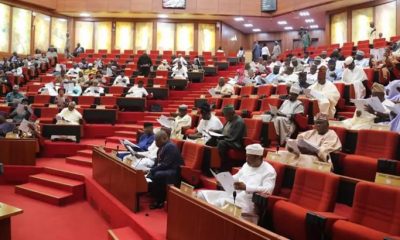News
Anti-open grazing bill prohibits cattle wandering, proposes 5 year jail term for offenders

The bill seeking to abolish open grazing in Nigeria and establish National Ranches seeks to amongst other things ensure the protection and preservation of geological, archeological historical aesthetics or scientific interests in the Ranches if signed into law.

The anti-open grazing bill sponsored by Senator Titus Tartenger Zam which has already passed through a second reading on the floor of the Senate awaiting public hearing also seeks to restrict movement of cattle from one Ranch to another or market except through vehicular means as contained in part IV, 22-(1), (6)and (7) of the bill.

The bill also proposes a N50,000 or imprisonment for 5 years or both for offenders who contravenes it’s provisions.
It also “prohibits bush burning and hunting within ranches areas as well as the use of chemicals, felling of trees, destruction of ecosystem in whatever form are strictly prohibited under this Act”.
The Senator Titus Zam sponsored bill also in part III, 17-1 (a)(b) and (c) clearly states the methods of acquiring lands for the proposed National Ranches as follows:
“The following lands may, subject to the provisions of this Act be constituted as National Ranches:
Lands at the disposal of the Federal Government, any land acquired by the commission through purchase, assignment, gift or otherwise, any land donated by a state Government”.
The bill equally refers to section 28(4) of the land use Act ,1978 and stipulates in its 18-(1) that “before any Ranch is established on any land under the provisions of section 17(1)(a) of this Act, due notice shall be given to the state Governor, where such land is situate , by the commission on behalf of the president of the Federal Republic of Nigeria of the intention of the commission to establish a Ranch and after the acquisition, same shall be publishes in the official Gazette of the Federal Government”.
The bill also mandates that the information about the acquisition shall specify the location, size or limits of such land, “declaring that it is intended to establish a Ranch in such a land either for the general purpose of Government or for the particular Use and benefits ,wholly or in part ,of any class of persons or for the benefit of any community, state or local Government”.
The bill also mandates the commission to pay the requisite compensation to the affected land owners whose lands are acquired for the purpose of establishing a National Ranch for the purpose of rearing cattle.
In his lead debate on the bill, the sponsor, senator Zam (APC Benue North West) told his colleagues that the increasing wave of violent conflicts between pastoralists and farmers in Nigeria have assumed a war-like dimension hence the need to bring the ugly situation under control through the establishment of National Ranches for the Regulation of animal husbandry as panacea for the growing crisis.
According to him, “as stakeholders in the Nigerian project and elected representatives of the , we cannot afford to look on while the country burns into ashes as a result of violent clashes between sedentary farmers and nomadic herders”.
Senator Zam told our correspondent that “As I have said earlier, reports have it that since 2016 more than 4000 lives have been lost as result of farmers -herders conflicts. Also over 5 million people have been displaced particularly in the middle Belt Region and other parts of Northern Nigeria. With dwindling productivity in crops production and herds, this conflict has reportedly cost the country an average of 3.5 million dollars or 47per cent of its internally generated revenue. The effect of herders – farmers conflict and its implication on food security in Nigeria is already starring us in the face as the cost of food items is almost beyond the reach of the common man”.
“Other countries with huge farmers and herders population including Mauritania, Mali, Burkinafaso and Niger in Africa have passed pastoral laws and codes which have helped to motivate the incidence of clashes between sedentary farmers and nomadic herders, this situation is unfortunately treated with kid-gloves in Nigeria.”
He marinated that “available data indicate that, India as at 2003 had about 308 million herds of cattle and it is the world number one country in animal husbandry, followed by Brazil , China and the USA. In Africa, Ethiopia has the highest number with 68 million cows as at 2022. Nigeria has a paltry 20.9million herds as at 2022, yet we are faced with the greatest problem of herders – farmers conflagrations”.
The bill was passed a week ago and awaiting public hearing for clause by clause consideration within four weeks.

























